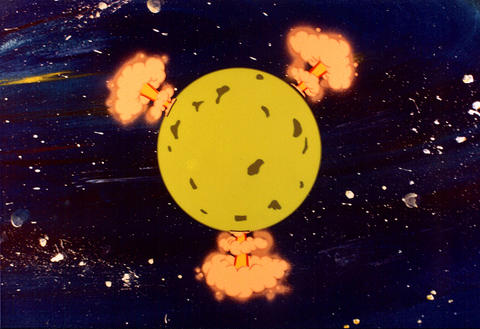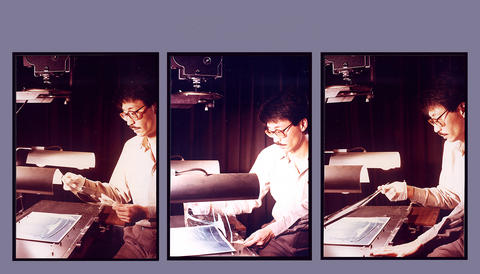In 1990 Kenbo Liao (廖褚健) saw a magazine article that mentioned his film The Great Ivory Wall (象牙牆), an animated short that won a Golden Harvest (金穗獎) award. He noticed that the second character in his name been changed to zuo (左), which means "left" or "lefty." Thinking there had been a mistake, he went to the Chinese Taipei Film Archive (國家電影資料館) and asked to see the movie. A woman at the counter told him they didn't have it; the reel had been destroyed in a fire. "She said I could see any other movie but that one," Liao told the Taipei Times on Thursday. "Somebody must hate me very much in order to bury me alive!"
Kenbo Liao's Life Works, Visions, Fantasies or Prophecies? - a retrospective that runs through Oct. 27 at Beat Studio - is a reminder of how much things have changed since then. When Liao produced The Great Ivory Wall, which features two cavemen who fight over boundaries and build a massive wall from mastodon tusks, Taiwan was still under martial law, and his cartoon was considered groundbreaking because it mixed politics with art. Another short, Sketch Book (畫冊), was produced on a Commodore Amiga computer and earned him a second Golden Harvest award because it was the only digital submission that year.
Liao, a US-trained moviemaker and designer who also produces still images for postcards and advertisements, believes art can influence politics. One of his favorite prints, inspired by a vision he had after suffering a head injury in a car accident, shows a paper airplane flying over a primordial Taiwanese landscape. Also inspired by that vision is a weirdly prophetic print of a Japanese biplane dropping a bomb on New York's World Trade Center.

PHOTOS: COURTESY OF KENBO LIAO
Visitors to the gallery can purchase reproductions of these and other once-subversive images on framed canvases and T-shirts. Liao will be present at the show's opening, which has been rescheduled for today because of last weekend's typhoon. Two of his films will be screened, and Hoklo poet Chen Chao-cheng (陳昭誠) will read several of his works.
Liao, 56, became less controversial after martial law was lifted. In the early 1990s he filmed Unknown Taiwan, an English-language documentary produced by now-Vice President Anette Lu (呂秀蓮), who used another of his images for presentations in Europe to support Taiwan's UN bid. The animator has yet to succeed in correcting his name in official records of his first Golden Harvest award. "The government is changing a lot of names now," he said. "I think they should change mine first."



PHOTOS: COURTESY OF KENBO LIAO

Taiwan Power Co (Taipower, 台電) and the New Taipei City Government in May last year agreed to allow the activation of a spent fuel storage facility for the Jinshan Nuclear Power Plant in Shihmen District (石門). The deal ended eleven years of legal wrangling. According to the Taipower announcement, the city government engaged in repeated delays, failing to approve water and soil conservation plans. Taipower said at the time that plans for another dry storage facility for the Guosheng Nuclear Power Plant in New Taipei City’s Wanli District (萬里) remained stuck in legal limbo. Later that year an agreement was reached

June 2 to June 8 Taiwan’s woodcutters believe that if they see even one speck of red in their cooked rice, no matter how small, an accident is going to happen. Peng Chin-tian (彭錦田) swears that this has proven to be true at every stop during his decades-long career in the logging industry. Along with mining, timber harvesting was once considered the most dangerous profession in Taiwan. Not only were mishaps common during all stages of processing, it was difficult to transport the injured to get medical treatment. Many died during the arduous journey. Peng recounts some of his accidents in

What does the Taiwan People’s Party (TPP) in the Huang Kuo-chang (黃國昌) era stand for? What sets it apart from their allies, the Chinese Nationalist Party (KMT)? With some shifts in tone and emphasis, the KMT’s stances have not changed significantly since the late 2000s and the era of former president Ma Ying-jeou (馬英九). The Democratic Progressive Party’s (DPP) current platform formed in the mid-2010s under the guidance of Tsai Ing-wen (蔡英文), and current President William Lai (賴清德) campaigned on continuity. Though their ideological stances may be a bit stale, they have the advantage of being broadly understood by the voters.

In a high-rise office building in Taipei’s government district, the primary agency for maintaining links to Thailand’s 108 Yunnan villages — which are home to a population of around 200,000 descendants of the Chinese Nationalist Party (KMT) armies stranded in Thailand following the Chinese Civil War — is the Overseas Community Affairs Council (OCAC). Established in China in 1926, the OCAC was born of a mandate to support Chinese education, culture and economic development in far flung Chinese diaspora communities, which, especially in southeast Asia, had underwritten the military insurgencies against the Qing Dynasty that led to the founding of